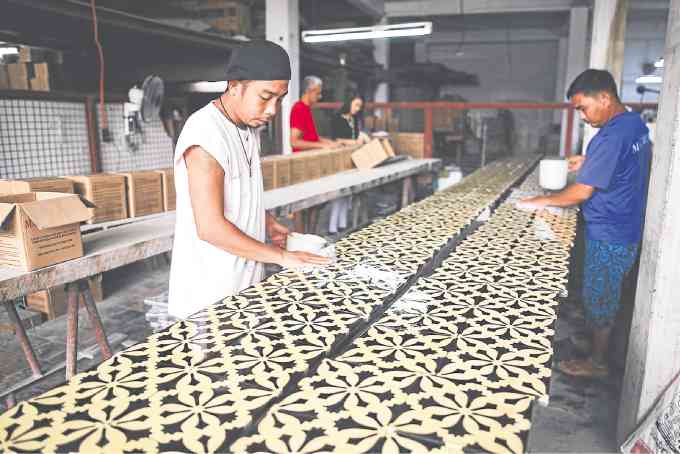
Tile makers put the finishing touch to handmade cement tiles. Machuca is the premier producer of Mediterranean-style cement tiles in the country. —PHOTOS BY JOHN PAUL R. AUTOR
At 23 years old, one of the top honchos of Machuca Baldozas Inc. isn’t even a quarter of the age of his cement tile-manufacturing company, which has been around since the early 1900s.
Not that age is stopping Jaime Machuca from taking charge of his family’s business, as he recently took on the role of vice president. “I thought it would be overwhelming, but no, I like what I’m doing,” says the Business Management graduate of De La Salle University.
“I’m overseeing everything, [but I focus] more on research and development, trying to improve the details,” he adds.
Machuca Baldozas Inc., known for its unique handmade cement tiles with Mediterranean designs, was first established by Machuca’s great-grandfather Don Jose Romeo Machuca in Manila’s San Miguel district.
Machuca is now part of the fourth generation running the company, along with one of his elder brother Luis, an architect, and their mother Elvira Vivian, who for the longest time managed the business herself after her husband passed away around 20 years ago.
Asked what the secret is to the firm’s sustainability, Machuca says, simply, that “it’s the name.”
“A lot of people, locally, when they look for cement tiles, they look for Machuca. They’d probably go to a competitor and [still] say, ‘Do you have Machuca?’ It’s gotten to that point,” he says.
When it comes to the manufacturing process, not much has changed: the hand-operated tile presses currently being used by their 11 tile makers are still the same ones the old Machuca brought to the country from Spain when he first started the business. Many of the patterns the company uses are original designs that have been in use since the 1900s.
“This is what we really pride ourselves in—handcrafted cement tiles. It’s really slow, it takes 10 minutes to make just one piece, but ever since, it’s always been like this. We’ve never changed the process; maybe fine-tuned some parts but generally it’s the same,” says Machuca.
The firm’s clients range from churches to cafes, restaurants, and, of course, homes. In fact, Machuca says many people seek them out because they grew up in homes decorated with the iconic tiles, and are looking to spruce up their own spaces with the same.
“The usual story is, ‘Oh, we have Machucas in our parents’ old house, and I want it for my own,’” says Machuca. “And they already know which pattern they had in their old house.”
“A lot of clients also like making custom-color combinations or patterns. And once we make a custom tile for someone, no one else can get it. We give them the pattern just to ensure to them that we won’t use it again,” he adds.
Interestingly, the fact that not much has changed with the company gives Machuca plenty of leeway to progress his family’s business.
His first agenda, he says, was to make the brand more present online, particularly social media.
“It’s an advantage if it’s easy to search [for the company]. I’d like to think that it’s paying off. Last year, we had half the number of tile makers. Now we’re actually having a hard time keeping up with supply,” he says.
Aside from supplying tiles, Machuca is also looking into offering installation services to ensure that proper care for their products is consistently observed. He also has plans of upgrading their machines and exporting, to compete with other cement tile companies from neighboring countries.
“Locally, we are the cheapest, and there are only three manufacturers who make these kinds of tiles. In Southeast Asia, though, there are lots of big companies, [which are] very cheap. So [we’re] trying to compete with them,” Machuca says.
Most important to the young heir, however, is improving the quality of work in the company, since it ultimately affects the brand and its relationship with clients. “My mother instilled it in us: we always have to make sure that we’re giving quality products. We even go so far as to say, if a client’s not happy, we’ll change it, give them back their money. We’re very customer-oriented,” he says.
Given his enthusiasm and vision for his company, plus the fact that he grew up literally playing inside their factory, it’s surprising to find out that this wasn’t Machuca’s immediate career choice.
“I would have still been into business, like a startup, since I don’t think I would have worked for a company,” he says. “But when I graduated, I didn’t know what to do, so my mom asked me to join. Now I’m in it for the long haul. Trying to improve everything, every aspect.”